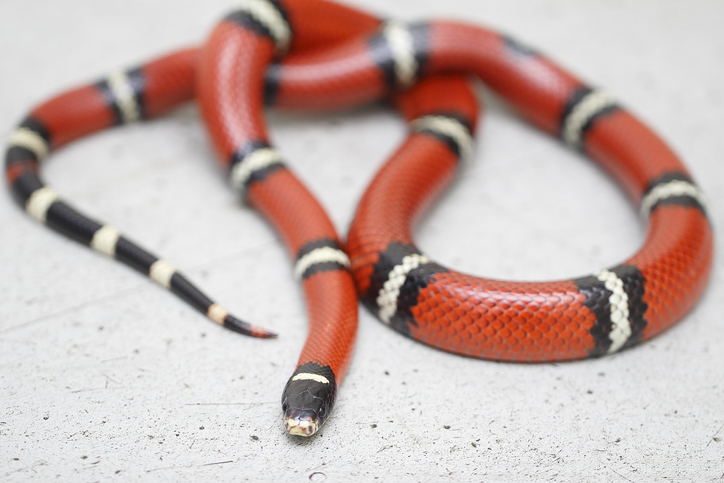FIND YOUR LOCAL
HUGHES SERVICE CENTER
Lampropeltis triangulum
Milk snakes are a harmless species of king snake, but they are often mistaken for coral snakes, their dangerous cousins. They are a common choice for a pet snake.

| Color | Red, black, and yellow or white, black, and red |
| Legs | 0 |
| Shape | |
| Size | 2-3 feet |
| Antennae | False |
There are several color variations milk snakes exhibit, but most are striped or blotchy. They tend to be red with black and a lighter beige, brown, or gray color. Milk snakes have small heads and a smooth and shiny appearance.
Milk snakes live across North America and can be found in much of the U.S., parts of Mexico, and Canada. Their habitat includes meadows, grasslands, and rocky hillsides. They like areas with plenty of cover, and they need a healthy rodent population to thrive.
These snakes are not venomous, so they pose little threat to humans. If threatened, they have a habit of vibrating their tails to mimic a rattlesnake. They may bite if harassed, but because they are non-venomous, they won’t do much harm. Milk snakes tend to stay hidden and are rarely seen around homes. They’re a beneficial snake to have in your area, as they do a great job of managing rodents.
The best way to prevent snakes in your yard is by removing hiding places like tall grass and unkept shrubs. Once milk snakes eliminate rodents around your home, they will leave to find a new food source. If you are able to confidently identify a milk snake, you can easily remove it with gloves and a trash bag. In most cases, the benefits of having a milk snake in your yard far outweigh the negatives, so these snakes can be left alone. If you’re having a hard time telling apart a milk snake from a coral snake, call Hughes Exterminators for professional snake identification and control.
After you submit the information below, a trained professional in your area will get in touch within 1-2 business days to set up a date & time that is convenient for you.